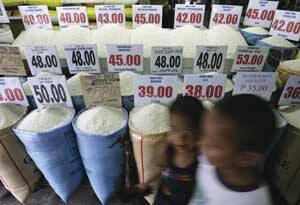Two years ago riots erupted in at least 15 developing countries over the cost of basic foods like rice, flour and corn. Frustrated by rapidly rising prices, demonstrators torched vehicles and clashed with police in a series of violent confrontations across Africa, Asia, South America and the Caribbean.
The rioting came as commodity prices peaked at the end of 2007 and the beginning of 2008, and the cost of wheat, corn, rice and soybeans more than doubled. Many forces were at work driving up the price of food—drought, increasing demand, conversion of cropland to biofuel production and skyrocketing costs of transport fuels among them. But one less scrutinized component of the crisis was the role of commodity market speculation as traders scurried out of a collapsing U.S. derivatives market into safer bets in foodstuffs.
Recognizing such speculative forces as a threat to the lives of poor people around the world, more than 450 faith-based, business and labor organizations have banded together in a campaign called Stop Gambling on Hunger. “We can’t let our world food and energy prices be determined by the whims of investors,” said David Kane, a staff member at the Maryknoll Office of Global Concerns in Washington, one of the leading voices on the issue. “It’s affecting the most vulnerable people around the world.” The coalition has been pushing legislation to reintroduce limits on speculative positions and in general put pressure on the Commodity Futures Trading Commission to better police trading activity related to food and energy commodities.
In testimony before Congress, Dave Andrews, a Holy Cross brother who is the senior representative at the coalition member Food and Water Watch, said he often cites the statements of Pope Benedict XVI, who has repeatedly spoken on the special vulnerability of the world’s poor to global market forces. In “Caritas in Veritate,” the pope said access to sufficient food and water resources is a human right and directly chastened the “speculative use of financial resources that yields to the temptation of seeking only short-term profit.” But in Brother Andrews’s view advocates need to move the issue out of Washington and into the home districts of members of Congress to improve awareness of the often hard-to-understand issue.
One unlikely voice for change has been Michael Masters, a hedge fund manager who worries over the excessive volatility speculative runs promote on commodity prices. “Should asset allocation decisions trump human rights?” he asked. “If a bunch of financial investors drive up the price of food, then people die. If people can’t eat, then there’s something wrong in the free market.”
Masters would like to see reforms that would restore controls over commodity markets that had been in place since the Great Depression but were abandoned in recent surges of political enthusiasm for market deregulation. Masters also has brought his concerns to Congress, testifying several times on the need for reforms. One reform measure, the Derivatives Market Manipulation Prevention Act of 2009, introduced by Senator Maria Cantwell, Democrat of Washington, would make it possible for federal regulators to investigate and crack down on market manipulators more effectively. Masters reported that while some in Congress appear to hear his concerns, there are still loud voices saying free markets should rule the day. “We’re not trying to reinvent the wheel,” he said. “Just put in the limits that worked for 50 years. It’s only when we got rid of the limits that you’ve seen much more volatility than we’ve ever seen in history.”








